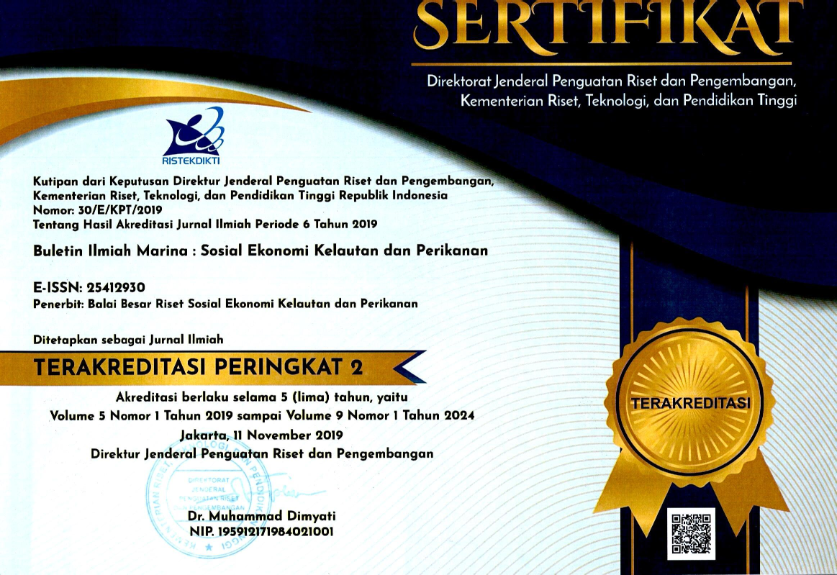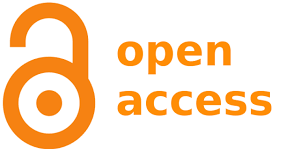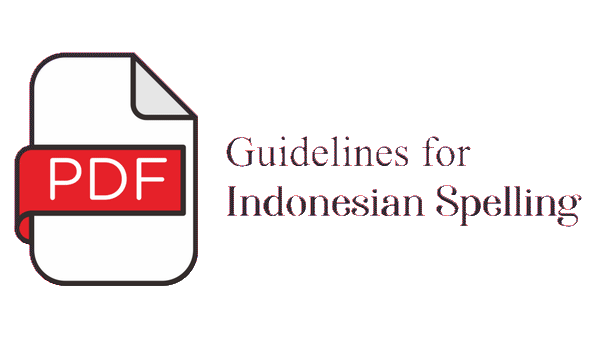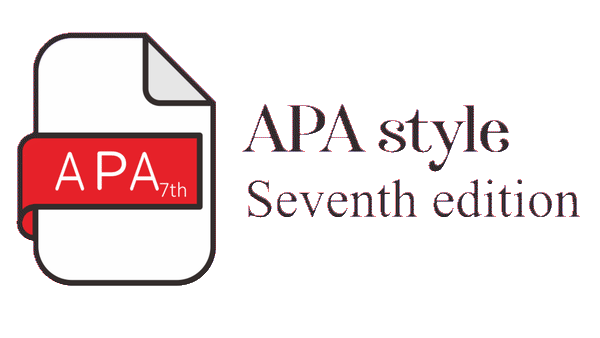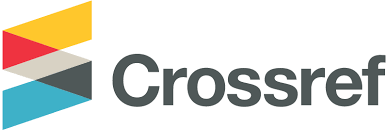PENDEKATAN SISTEM SOSIAL – EKOLOGI DALAM PENGELOLAAN WILAYAH PESISIR SECARA TERPADU
Abstract
Pemanfaatan sumber daya di wilayah pesisir mencakup konteks sosial multiple use, berbagai bentuk kepemilikan, dan konflik atas penggunaan sumber daya. Sistem ekologi di daerah pesisir sangat berhubungan erat dengan/dan dipengaruhi oleh satu atau lebih sistem sosial. Pendekatan kontemporer pengelolaan pesisir dan lautan berbasis sosial - ekologi pada dasarnya adalah integrasi antara pemahaman ekologi (ecological understanding) dan nilai – nilai sosial ekonomi (socio-economic value). Analisis sistem ekologi-sosial (SES) dalam pengelolaan wilayah pesisir terpadu mampu memberikan suatu pendekatan yang interdisipliner dan framework pengelolaan sumber daya yang berkelanjutan. Analisis SES dapat menjadi basis pengetahuan untuk mengatasi secara sistematis masalah yang kompleks dalam pengelolaan pesisir secara terpadu, selain itu juga dapat mengembangkan suatu strategi berbasis pengetahuan dalam memahami proses-proses ekologi dan sosial pada dimensi sistem dan skala yang berbeda.
Title: Social – Ecological System (SES) Approach In Integrated Coastal Management
Utilization of resources in coastal areas includes multiple use social contexts, various forms of ownership, and conflicts of interest. The purpose of this paper is to learn about the Social-Ecological System approach in integrated coastal management. Ecological systems in coastal areas have a very close relationship with / and are influenced by the social system. Basically the contemporary approach of coastal management based on social-ecology system (SES) is the integration between ecological understanding and socio-economic value. SES analysis in integrated coastal area management is able to provide an interdisciplinary approach and a sustainable resource management framework. SES analysis can be a knowledge base for dealing systematically with complex problems in integrated coastal management, while also developing a knowledge-based strategy in understanding ecological and social processes in different dimensions of the system and scale.
Keywords
Full Text:
PDFReferences
Anderies, J.M., M.A. Janssen, E. Ostrom, 2004. A framework to analyze the robustness of socialecological systems from an institutional perspective. Ecology and Society. Fakultas Perikanan dan Ilmu Kelautan, Universitas Halu Oleo. Vol 9(1): 18. [online] URL: http:// www.ecologyandsociety.org/vol9/iss1/art18. (diakses pada tanggal: 28 November 2014)
Berkes, F., dan C. Folke (Eds.), 1998. Linking Social and Ecological Systems: Management Practices and Social Mechanisms for Building Resilience. Cambridge University Press. Cambridge.
Cicin-Sain, B. dan Knecht, R. 1998. Integrated Coastal and Ocean Management: Concepts and Practices, Island Press, Washington, D.C., 517 pp.
Cooper, P. 2013. Socio-ecological accounting: DPSWR, a modified DPSIR framework, and its application to marine ecosystems. Ecological Economics. Vol 94: 106–115.
Dahuri, R., J. Rais, S.P Ginting, M.J Sitepu (cet. 2). 2001. Pengelolaan Sumber daya Wilayah Pesisir dan Lautan Secara Terpadu. PT. Pradnya Paramita. Jakarta.
Davidson-Hunt, I.J. dan F. Berkes, 2003. Nature and society through the lens of resilience: toward a human-in-ecosystem perspective. In Berkes, F., J. Colding, C. Folke (Eds.), Navigating Social– Ecological Systems: Building Resilience for Complexity and Change. Cambridge University Press. Cambridge.
Earth Summit. 2003. UN Conference on Environment and Development (1992). http://www.un.org/ geninfo/bp/enviro.html. (diakses pada tanggal 30 November 2013).
Folke, C., C.S Holling, C. Perrings, 1998. Biological diversity, ecosystems and the human scale. Ecological Applications. Vol 6:1018 - 1024.
Folke, C., J.Colding, F. Berkes, 2003. Synthesis: building resilience and adaptive capacity in social–ecological systems. In Berkes, F., J. Colding, C. Folke, (Eds.), Navigating Social– Ecological Systems: Building Resilience for Complexity and Change. Cambridge University Press. Cambridge. Glaeser, B., K. Bruckmeier, M.Glaser dan G. Krause, 2007. Social-Ecological Systems Analysis in Coastal and Marine Areas: A Path toward Intregration of Interdisciplinary Knowledge in Current Trends in Human Ecology. Proceeding of International symposium of the Society for Human Ecology Tahun 2017. Rio de Janeiro.
Hinrichsen, D. 1998. Coastal Waters of the World: Trends, Threats, and Strategies. Island Press. Washington DC.
Janssen, M.A., O. Bodin, J.M. Anderies, T. Elmqvist, H. Ernston, R.R.J. McAllister, P. Olsson, and P. Ryan. 2006. Toward a Network Perspective of the Study of Resilience in Socio-Ecological Systems. Ecology and Society vol 11(1): 15. http://www.ecologyandsociety.org/vol11/iss1/ art15/. (diakses pada tanggal: diakses pada tanggal: 1 Desember 2013)
Parsram K., 2008. Social-ecological System Interactions in Small-scale Fisheries: Case Studies of the Large Pelagic and Shallow Reef Fisheries of Grenada and St. Lucia Under Construction. Proceedings of the Gulf and Caribbean Fisheries Institute 61:57-66.
Subandono, D., Budiman, dan F.Agung. 2009. Menyiasati Perubahan Iklum di Wilayah Pesisir dan Pulau-Pulau Kecil. Penerbit Buku Ilmiah Populer. Bogor.
Sulistiawati, D. 2011. Model Integrasi Wisata-Perikanan di Gugus Pulau Batudaka Kabupaten Tojo Una-Una Provinsi Sulawesi Tengah. Disertasi. Sekolah Pascasarjana. Institut Pertanian Bogor. Jakarta.
Yanuarita, D., dan Neil. 2005. Pemanfaatan Sumberdaya Laut Kepulauan Spermonde. http://www.scribd.com/doc/42934946/33-dewi. (Diakses pada tanggal 27 November 2013)
Yulianda F, A. Fahrudin, dan L. Adrianto. 2010. Pengelolaan Pesisir dan Laut Secara Terpadu. Book 3, Pusdiklat Kehutanan-Departemen Kehutanan RI, SECEM Korea Internasional Cooperation Agency. Bogor
DOI: http://dx.doi.org/10.15578/marina.v4i2.7389
Refbacks
- There are currently no refbacks.
Indexed by:
---------------------------------------------------------------------------------------
Published by
Balai Besar Riset Sosial Ekonomi Kelautan dan Perikanan
in collaboration with
Indonesian Marine and Fisheries Socio-Economics Research Network

This work is licensed under a Creative Commons Attribution-NonCommercial-ShareAlike 4.0 International License.

